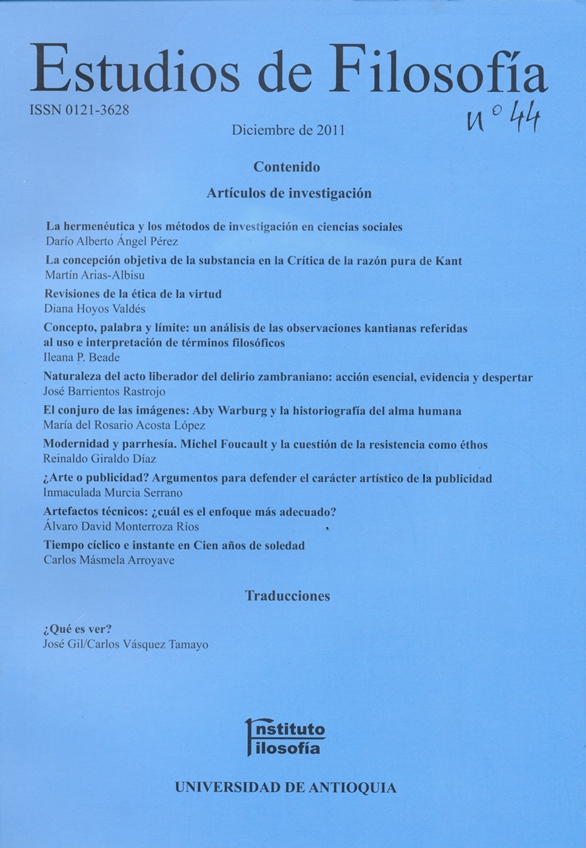Hermeneutics and research methods of Social Science
DOI:
https://doi.org/10.17533/udea.ef.12633Keywords:
Hermeneutics, social sciences, research methodologiesAbstract
This article gives a reading of seven methodological perspectives in social sciences, from the keys of Hermeneutics: Phenomenology, Grounded Theory, Case Study, Ethnography, Participatory Action Research-IAP- Social Cartography and narrative inquiry. For each tradition, there is a general description and then a contrasting the criteria developed by the hermeneutic philosophy
Downloads
References
ÁNGEL, D. (2007) Memoria y narrativas. En: Revista Ánfora Nº 23, año 14. Manizales: Universidad Autónoma de Manizales.
AUGÉ, M. (1998) Las formas del olvido. Barcelona: Gedisa.
CRESWELL, J. W. (1998) Qualitative Inquiry and Research Design: Choosing Among Five Traditions. Thousand Oaks, California: Sage Publications, Inc.
EKINS, R. (1998) Male Femaling: a Grounded Theory Approach to Cross-dressing and Sex-changing. London: Routledge.
FALS–BORDA, O. (2009) “Orígenes universales y retos actuales de la Investigación – Acción Participativa. En: Jahir Rodríguez et al, Desarrollo regional y planificación del territorio, cuadernos de clase Nº 2. Manizales: Universidad Autónoma de Manizales.
GADAMER, H. G. (1977) Verdad y Método. Salamanca: Sígueme.
GEERTZ, C. (2000) La interpretación de las culturas. Barcelona: Gedisa.
GLASER, B. y STRAUSS, A. (1967) El desarrollo de la teoría fundada. Chicago, Illinois: Aldine.
HEIDEGGER, M. (2007) Hermenéutica de la Facticidad [Hermeneutik der Faktizität – 1923]. Madrid: Alianza.
HERRERA, J. D. (2009) La comprensión de lo social. Horizonte hermenéutico de las ciencias sociales. Bogotá: Cinde.
HERRERA, J. D. (2009a) Metodología de investigación para la caracterización del conflicto escolar. Módulo de capacitación. Documento inédito. La hermenéutica y los métodos de investigación en ciencias sociales
MARTÍ, O. (2003) “Habla Claude Lévi-Strauss”. En: El País. Madrid, 11 de enero de 2003.
MERRIAM, S. (1988) Case Study Research in Education. A Qualitative Approach. San Francisco: Jossey – Bass.
RIAÑO ALCALÁ, P. (2006) Jóvenes, memoria y violencia en Medellín. Una antropología del recuerdo y el olvido. Medellín: Universidad de Antioquia e Instituto Colombiano de Antropología e Historia.
RICOEUR, P. (1999a) Historia y narratividad. Barcelona: Editorial Paidós.
RICOEUR, P. (2004) La memoria, la historia, el olvido. Buenos Aires: Fondo de Cultura Económica.
STAKE, R. (1998) Investigación con estudio de casos. (trad.). Roc Filella 3ª ed. Madrid: Ediciones Morata.
STRAUSS, A. y CORBIN, J. (2002) Bases de la investigación cualitativa. Técnicas y procedimientos para desarrollar la teoría fundamentada. Bogotá: (2a. ed.) CONTUS-Editorial, Universidad de Antioquia
TODOROV, T. (1995) Les Abus de la Mémoire. París: Arlea.
VALLES, M. (1997) Técnicas cualitativas de investigación social. Reflexión metodológica y práctica profesional. Madrid: Síntesis s.a.
VILLASANTE, T. (1999) “De los movimientos sociales a las metodologías participativas”. En: Delgado y Gutiérrez (eds.). Métodos y técnicas cualitativas de investigación social. Madrid: Síntesis.
YIN, R. K. (1994) Case Study Research. Design and Methods. London: Sage, 1994.
Downloads
Published
How to Cite
Issue
Section
Categories
License
Copyright (c) 2011 Darío Alberto Ángel Pérez

This work is licensed under a Creative Commons Attribution-NonCommercial-ShareAlike 4.0 International License.
Authors who publish with this journal agree to the following terms:
1. The Author retains copyright in the Work, where the term "Work" shall include all digital objects that may result in subsequent electronic publication or distribution.
2. Upon acceptance of the Work, the author shall grant to the Publisher the right of first publication of the Work.
3. The Author shall grant to the Publisher a nonexclusive perpetual right and license to publish, archive, and make accessible the Work in whole or in part in all forms of media now or hereafter known under a Creative Commons Attribution-NoCommercia-ShareAlike (CC BY-NC-SA 4.0), or its equivalent, which, for the avoidance of doubt, allows others to copy, distribute, and transmit the Work under the following conditions: (a) Attribution: Other users must attribute the Work in the manner specified by the author as indicated on the journal Web site;(b) Noncommercial: Other users (including Publisher) may not use this Work for commercial purposes;
4. The Author is able to enter into separate, additional contractual arrangements for the nonexclusive distribution of the journal's published version of the Work (e.g., post it to an institutional repository or publish it in a book), as long as there is provided in the document an acknowledgement of its initial publication in this journal;
5. Authors are permitted, and Estudios de Filosofía promotes, to post online the preprint manuscript of the Work in institutional repositories or on their Websites prior to and during the submission process, as it can lead to productive exchanges, as well as earlier and greater citation of published work (see The Effect of Open Access). Any such posting made before acceptance and publication of the Work is expected be updated upon publication to include a reference to the Estudios de Filosofía's assigned URL to the Article and its final published version in Estudios de Filosofía.















